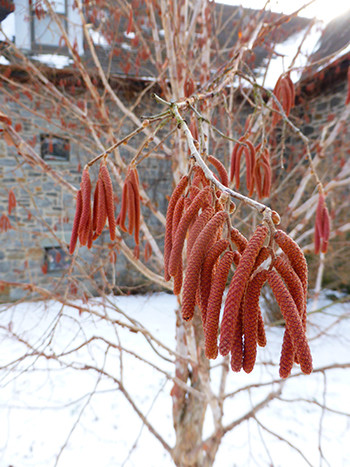
Plants of the Week: January 9
While documented in herbarium specimens, Corylus fargesii was unknown in Western cultivation until two North America-China Plant Exploration Consortium (NACPEC) collecting expeditions to China in 1996 and 2005 returned with seeds of the hazel species. Collectors described it as a truly beautiful tree with exquisite bark. A specimen grown from seed by the Morris Arboretum from the 1996 collection can be seen between Worth Health Center and Mertz Hall. Exfoliating bark in shades of gray, tan and amber bears a resemblance to Acer griseum and Betula nigra. Numerous pendant clusters of catkins hang from terminal branch ends. Toothed, oval-shaped green leaves turn yellow in autumn. The tree’s ornamental nature coupled with its fast growth rate and adaptability to a range of growing conditions shows great promise as an addition to the garden. Photo credit: J. Coceano
Nandina domestica [FlirtTM] ‘Murasaki’ is a tight, densely-mounded dwarf cultivar with reddish-purple foliage offered by the Southern Living Plant Collection. Discovered at Magnolia Gardens Nursery as a sport of Nandina domestica ‘Harbour Dwarf’, FlirtTM differs from its parent in that the new growth, a rich stunning purple, is retained for months before transitioning to a dark green. The cultivar name ‘Murasaki’ means purple in Japanese, another reference to the vivid color of the new growth. Consider adding the cultivar to the front of the border or as a container plant. It can be found in the Terry Shane Teaching Garden on campus. Photo credit: J. Coceano
I tackle late winter and spring cutback by consciously starting with those plants that haven’t held up well through winter’s onslaught of wind, rain, sleet, and snow. One perennial that has thus eluded the hedge trimmers is Vernonia lettermannii ‘Iron Butterflies’ In addition to its Amsonia-like foliage and magenta-purple flowers, ’Iron Butterflies’ was selected for its compact and upright habit. The stout and sturdy stems, capable of holding a multitude of summer flowers, also translate to a plant with equally outstanding winter interest. A beautiful stand can be found in the BioStream. Photo credit: J. Coceano








No Comments